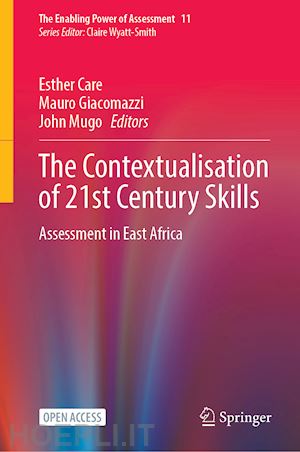

Questo prodotto usufruisce delle SPEDIZIONI GRATIS
selezionando l'opzione Corriere Veloce in fase di ordine.
Pagabile anche con Carta della cultura giovani e del merito, 18App Bonus Cultura e Carta del Docente
This open access book is written for educators and policymakers who seek to empower young people with competencies necessary for fulfilling lives in the 21st century. It reports how a large group of educators from government and civil society organisations, together with researchers from universities, used their curriculum, assessment, and social economy expertise to develop contextualised definitions of life skills and values, and associated assessment tools. The book also reports on levels of these competencies of over 45,000 adolescents, from a household-based assessment conducted in Kenya, Tanzania, and Uganda. The results describe how these adolescents vary in proficiency by region, age, and other factors, providing a resource for national education ministries to factor into policy decisions.
Given the technical requirements of measuring individuals’ social-emotional and related competencies, how is it possible to capture an adolescent’s life skills across varied contexts? The book provides readers with a pragmatic yet technically robust process for undertaking a large-scale assessment program designed to inform policy.
Part1: The 21st century skills phenomenon: Chapter1. 21st century ‘competencies” in East Africa: contextualisation to assessment.- Chapter2. Generation and use of assessment data to inform policy in East Africa.- Part 2 :Global and contextual perspectives on collaboration: Chapter3. Global and contextual perspectives on self-awareness and respect.- Chapter4. Global and contextual perspectives on problem solving.- Part 3 :Approaches to measurement of 21st century skills: Chapter5. Challenges of ‘visible behaviours’ in monitoring collaboration.- Chapter6. Scenario approach to assessment of lifeskills.- Part4: 21st century skills proficiency of adolescents in East Africa: Chapter7. Implications of adolescent proficiencies for education policy in East Africa.
Esther Care is a Professorial Fellow at the University of Melbourne, Australia, and publishes in peer reviewed journals in psychometrics, assessment, and education reform. Previously a Senior Fellow with the Brookings Institution, Washington DC, Esther leads regional projects which explore integration of 21st century skills into education policy and practice. Her specific interest lies in exploring approaches to assessment of 21st century skills through which pursuit she acts as Technical Adviser to ALiVE.
John Kabutha Mugo is Executive Director, Zizi Afrique Foundation, Kenya. He researches foundational literacy and numeracy, whole-child development, and parental and youth engagement. He is Principal Investigator of Assessment of Life Skills and Values in East Africa (ALiVE), developing contextualized tools across Kenya, Tanzania and Uganda. John led the Uwezo learning assessments in East Africa, and chaired the Department of Special Needs education at Kenyatta University.
Mauro Giacomazzi serves as Education Adviser at the Luigi Giussani Institute of Higher Education. Passionate about education, Mauro has a diverse background in designing professional development programs to enhance teachers' competencies in instructional design and to assess life skills. As a Principal Investigator of Assessment for Life Skills and Values in East Africa (ALiVE) and a Board member of the Regional Education Learning Initiative, he actively contributes to educational initiatives and development in the region.











Il sito utilizza cookie ed altri strumenti di tracciamento che raccolgono informazioni dal dispositivo dell’utente. Oltre ai cookie tecnici ed analitici aggregati, strettamente necessari per il funzionamento di questo sito web, previo consenso dell’utente possono essere installati cookie di profilazione e marketing e cookie dei social media. Cliccando su “Accetto tutti i cookie” saranno attivate tutte le categorie di cookie. Per accettare solo deterninate categorie di cookie, cliccare invece su “Impostazioni cookie”. Chiudendo il banner o continuando a navigare saranno installati solo cookie tecnici. Per maggiori dettagli, consultare la Cookie Policy.